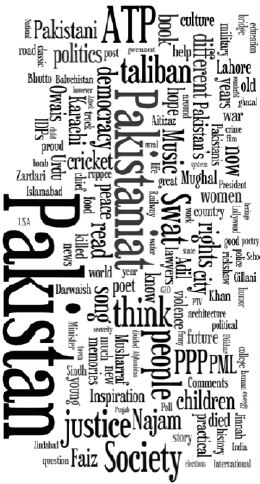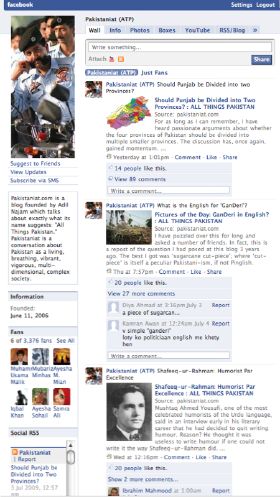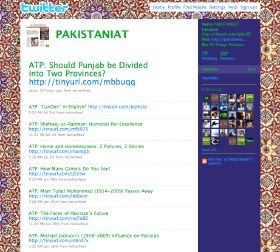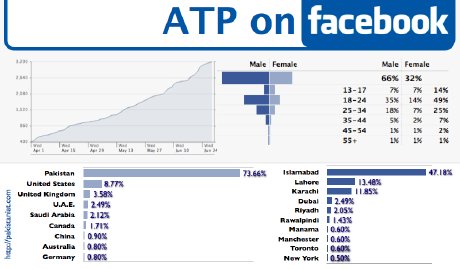Adil Najam
 In the 1,120 days that we have run Pakistaniat.com we have never had a dearth of topics to write about on Pakistan. Between our volatile politics, our effervescent society, our explosive geopolitics, our rich cultural heritage, our captivating literature and music, there is always something to say about Pakistan and Pakistaniat.
In the 1,120 days that we have run Pakistaniat.com we have never had a dearth of topics to write about on Pakistan. Between our volatile politics, our effervescent society, our explosive geopolitics, our rich cultural heritage, our captivating literature and music, there is always something to say about Pakistan and Pakistaniat.
Today is no different.
But today, for no particular reason at all, I want to do something different. Based on many interesting discussions I have had with ATP-readers I have met, I want to share with you some interesting facts about this blog itself – I suspect that some of these factoids might surprise some of you.
#1. Who Reads Pakistaniat.com
Many regular readers seem to believe that the majority of the readers of Pakistaniat.com come from the United States and, conversely, relatively few read us in Pakistan itself. Except for possibly the first few weeks of its existence, this has never, in fact, been true. It is less true today than ever before. Indeed, we seem to be witnessing a sudden (and very welcome) rise in visitors from Pakistan itself. This probably has much to do with the increasing internet connectedness of Pakistan and Pakistanis, but as its result, there is a rather interesting demographic shift happening within our readership and within our comments pages.
We do take statistics and numbers seriously, but over the year we have tried hard not to obsess about them. In fact, while we do not shy away from controversial topics that we deem substantively important, we try hard not to use controversy or sensationalism as a tool to attract readers. Yet, we have been lucky enough to have seen a steady and continuing growth in readership throughout our three years. Let me focus here on where these readers come from. Google Analytics tells me that over the two years that we have used it we have been visited by readers from 218 different countries and terrotories. Of course, the bulk come from a few selected locations.
Until the end of last year, the proportion of readership share was fairly steady. A little more than a third (around 35%) of our visitors logged in from Pakistan, around a third (~33%) came from the US) and the remaining (just under a third) came from the rest of the world, but mostly from Western Europe, the Middle East and, depending on current events, from India.
As the figure shows, things have changed somewhat recently. Last month (June 2009) over 44% of our visitors logged in from Pakistan and a little over half as many (23%) from the United States. It is important to note that the number of visitors from USA has not gone down, it is only that the new growth in numbers is being driven mostly, but not entirely, by new readers from Pakistan (see line graph on Readership Growth in 2009). This is interesting because earlier the growth would generally be proportional across different regions.
The list of countries from where we get a large number of readers has remained largely constant over the years – for most part these are countries with significant populations of Pakistanis: United Kingdom, Canada, U.A.E. Saudi Arabia, Australia, Germany, etc. In the case of India, the reasons for the interest in Pakistan and things Pakistani is obvious. We have – and have had from the beginning – a reasonable (and generally supportive) following in India but the number of visitors from India varies wildly between weeks and months, mostly dependent on whether issues directly related to India-Pakistan relations are in the news. (As regular readers know, we try hard to keep a Pakistan-centric focus to our discussions and international affairs is not our main priority. Maybe, this is because in my professional life – as a professor of International Relations – that is what I do all the time!)
The regional distribution for June 2009 suggests that nearly half of our visitors came from our Southern Asia (including some in Bangladesh, Afghanistan, and Iran). Another 30% came from North America (USA and Canada), Western and North Europe contributed 12% of our readership and the Gulf and Middle East region another 5%. A not insignificant number (3.6%) came from East Asia and Oceania, including Australia, Malaysia, China, Singapore, Japan, etc. The 2.6% listed as ‘other’ includes some visitors from Africa and South America but a large number of IP addresses that could not be geographically classified.
Looking at the cities the people log in from is interesting, but also potentially misleading (depending on markets, the IPs can either be too consolidated in classification, or too dispersed). For what it is worth, the top three cities from which people logged into All Things Pakistan in June 2006 were Karachi, Lahore and Islamabad. This was followed – not closely at all – by London, New York, Peshawar, Dubai and San Francisco.
#2. The Facebook Factor
 As regular readers know – and largely on the behest of readers who asked us to do so – ATP is now on both Twitter and on Facebook. The purpose of going on both was the same: to give readers a way of being alerted on when new posts were put up on All Things Pakistan. For most part, most people who follow us on Twitter and on Facebook use it for that purpose. These are convenient ways for them to be updated on when ATP is updated. In addition, we have found these useful ways to sometimes share additional information on which we did not or could not do seperate posts (e.g., during T20 cricket, sometimes when bomb blasts have happened, and sometimes when the ATP main site was having trouble). From the feedback I have recieved, people who have signed up with ATP on Twitter and on Facebook have found these quite useful in this respect.
As regular readers know – and largely on the behest of readers who asked us to do so – ATP is now on both Twitter and on Facebook. The purpose of going on both was the same: to give readers a way of being alerted on when new posts were put up on All Things Pakistan. For most part, most people who follow us on Twitter and on Facebook use it for that purpose. These are convenient ways for them to be updated on when ATP is updated. In addition, we have found these useful ways to sometimes share additional information on which we did not or could not do seperate posts (e.g., during T20 cricket, sometimes when bomb blasts have happened, and sometimes when the ATP main site was having trouble). From the feedback I have recieved, people who have signed up with ATP on Twitter and on Facebook have found these quite useful in this respect.
On Facebook, however, something rather interesting has happened on the way. A whole new group of readers and commenters have emerged on Facebook who (from what we can tell) prefer to comment there rather than on the main site. Those who comment on the main ATP site do not do so at Facebook and those who comment at Facebook tend not to do so at the main site. On many recent posts, the number of comments recived on ATP at Facebook were more than at the main ATP site. More importantly, the nature of comments can be very different. Facebook encourages short, intense, responses (often, but not always, just to headlines) while the main site attracts comments that are more discurcive.
 But what makes this most interesting is that people signing up (over 3,400 have registered to date) for ATP at Facebook are quite different from those who read us at the main ATP site. We know this because Facebook actually gives some very good statistics on those who have signed up for ATP at Facebook.
But what makes this most interesting is that people signing up (over 3,400 have registered to date) for ATP at Facebook are quite different from those who read us at the main ATP site. We know this because Facebook actually gives some very good statistics on those who have signed up for ATP at Facebook.
In essence our Facebook readership is much younger and much more likely to be from Pakistan. This may well change because we have been on Facebook for only a little over three months, but as of now, 63% of our Facebook readership is under 24 years of age and 74% of them log in from Pakistan (only around 9% from USA, 3.6% from the UK, and 2.5% from U.A.E.). From whatever we can tell, this is a very different distribution from what is likely to be at the main ATP website.

Of course, we welcome all readers everywhere. Facebook readers are likely to be different because many may sign up but not actually interact and/or most use it simply as an alerting device to get to the main ATP site when new posts are posted. However, I find it interesting that because of the very different demographics the comments can be very very different at the two places – this was the case, for example, on the recent post about dividing Punjab into two provinces. My only hope is that over time there will be more co-mingling between these two sets of commenters. This would, I am sure, make discussions at both places far more interesting.
#3. The Power of Community
Probably the thing that surprises most readers the most is to find out that Owais Mughal and myself (between us we manage the day-to-day operation of this blog) have never actually met each other. In fact, of the four people in the editorial team (Owais Mughal, Adil Najam, Darwaish and Asma), no two have ever met each other. This will hopefully change later today – Owais Mughal is visiting Boston with his family and we are planning to meet up for dinner at my house tonight.
The point, however, is that for so long we have been able to collaborate intensely and intensively through times of political turbulence and divisive discourses. This is a testimony to Owais’s calm and collaborative demeanor as much as to the power of the internet as a tool of communication as well as community. In fact, there are scores of readers who have been loyal to ATP for years and who I would not recognize if I met them but whose deep passions I recognize with intense familiarity. Conceptually, this is a significant indicator of how technology is changing the very meaning of communication, of collaboration, and indeed of community.
P.S. The word map used at the beginning of this post and elsewhere on the site is a collage generated by analyzing all the words used in the last 500 posts at ATP and sized by importance and frequency of use.




















































Im Indian, based in Sydney. Fan of Pakistaniat and friend of Pakistan.
Adil and ATP team, thanks for a job well done. I have been a Pakistaniat fan pretty much since the site’s creation. Have also been fortunate to contribute a couple of pieces to this excellent resource. I have long been convinced that along with Pakistan’s private free media this site is actually helping articulate a new identity and definition of Pakistaniat that is based on a shared culture and experience instead of religion alone or opposition to India. Excellent work!
This is by far the best Pakistani website/blog around. One of the BEST in entire south asia.
i am a regular visitor here and am surprised by the DIVERSITY AND RICHNESS of the ideas exchanged here.
i wish you guys all the success that this website truly deserves.
Lots of love and hugs.
I recently signed up for your Facebook page and although I did not think it was a good idea now am very glad you have that. the people there are very different and younger and in Pakistan and they need to be exposed to these ideas. I sometime get frustrated by some of the comments there because the intellectual quality is so much lower than here. But now I realize that here we are all talking to the converted, at your Facebook page we have a unique opportunity to make a difference by actually trying to talk to and change the opinions of people who are young and will make a difference in the future. So, I am glad that you are continuing these discussions there and taking them to new audiences.
I visit this website frequently but i couldn’t pass this opportunity to not speak. I am of Indian origin but i am honestly fascinated by the diversity of people and thier views. This is by far a very balanced website. Especially indians tend to believe pakistanis are way too religious to think rationally. I only had to visit this website to prove myself wrong.. As much as pakistanis hate Zardari, indians just love him. I am almost willing to say they are “obsessed” with him. good work guys …